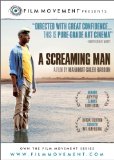| Reviews & Columns |
|
Reviews DVD TV on DVD Blu-ray 4K UHD International DVDs In Theaters Reviews by Studio Video Games Features Collector Series DVDs Easter Egg Database Interviews DVD Talk Radio Feature Articles Columns Anime Talk DVD Savant Horror DVDs The M.O.D. Squad Art House HD Talk Silent DVD
|
DVD Talk Forum |
|
|
| Resources |
|
DVD Price Search Customer Service #'s RCE Info Links |
|
Columns
|
|
|
Screaming Man, A
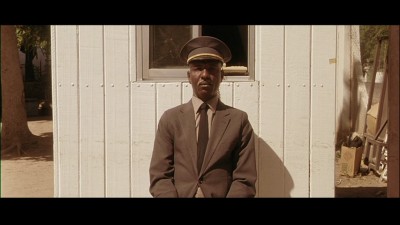
A Screaming Man (Un Homme qui crie) is the kind of war film I would like to see more of: one in which no action-packed, choreographed, adrenaline-pumping battles are depicted. Instead, its writer/director, Mahamat-Saleh Haroun, who comes from the war-torn Central African nation of Chad (where A Screaming Man is set), draws from his own personal experience of and sensitization to war and its far-reaching consequences to tell a story focusing on the ordinary lives and struggles of some of the many peaceable, workaday civilians unwillingly and unfairly caught in the middle of the fighting. The film is a revelation, not just for its moving, clear-eyed portrait of the impact that armed conflict has on striving, "common" people, but also for exposing us to the flourishing of Haroun's unmistakable, abundant gifts as a filmmaker. He is not (yet) an internationally familiar celebrity-auteur on the scale of an Almodovar or a von Trier, but he realistically could be; from start to finish, this film feels like the expression of a major cinematic voice.
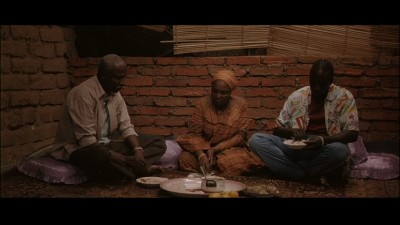
The weary patriarch of the family at the center of A Screaming Man is Adam Ousmane (Youssouf Djaoro), known as "Champion" to his friends because of his long-faded glory as an Olympic-hopeful swimmer. Adam works alongside his 20-year-old son, Abdel, as the caretaker of the swimming pool at an upscale tourist resort. But the recent privatization of the hotel (it has apparently been bought out by Chinese investors) means that the new, profit-driven management is cutting out any perceived redundancies, and two pool attendants is deemed one too many. Abdel is given his father's job, and Adam is demoted to parking lot gatekeeper. Grim social and corporate realities thus drive a wedge between father and son, taking away his stable, remunerative, even fulfilling pool-related duties--a central attribute of his life that allows him, as he approaches old age, to feel useful, dignified, and somehow still connected to his more vital, promising past.
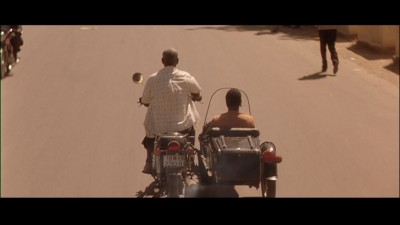
That is the everyday, common-enough struggle (jobs, money, family tensions, aging--things most human beings, regardless of race, religion, culture, or politics, are familiar with) faced by the Ousmane family. But eating away at the edges of this difficult but survivable, sometimes even cozy and comfortable semblance of a normal life is the ongoing, violent conflict/civil war between Chad's government and rebel forces, which, in the film, appear to be two sides of the same wrongheadedly violent, inhumane coin, with the government perhaps coming off worse for its hypocrisy, militaristic authoritarianism, exploitation of "patriotism," and underhanded manipulations. Adam is hounded by his neighborhood chief/government representative to do his "patriotic" duty; this underpaid, possibly soon-to-be-unemployed man apparently must either make a prohibitively large, obligatory financial contribution to the government on behalf of the war effort; "donate" Abdel into military service as a suitably valuable commodity (a young, healthy, male soldier); or be accused of shirking his obligation or even siding with the despised rebels. Adam must wait helplessly as the default conscription of his son into brutal, deadly combat becomes more and more of a looming certainty. Meanwhile, the family he can already barely hold together is expanding; Abdel's girlfriend, Djénéba (Djénéba Koné) is pregnant with Adam's grandchild, who may be left fatherless if Abdel is forced, because of his father's inability to pay, into the path of rebel bullets. In the face of the grave political and societal problems that are now piled onto and permeating his and his family's life, which is already weathering its fair share of disappointments and setbacks, Adam's ability to continue being the quiet, dedicated, responsible family man and good, reliable, productive citizen and friend he has always been is jeopardized as the compounding, inescapable stresses and worries begin to overwhelm him.
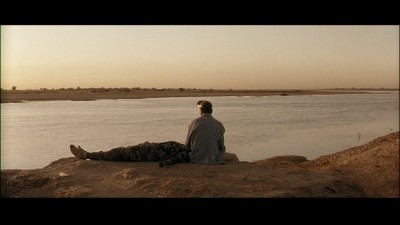
Haroun has cited as an influence the great Taiwanese filmmaker Hou Hsiao-Hsien--a master of filming his people and places from a distant or even obfuscating vantage point in a wide, composed frame, and in this manner somehow increasing our intimacy with the characters rather than diminishing it--and this influence is evident in his unerring, finely tuned eye for light, space, color, and sound. He and DP Laurent Brunet, generally avoiding close-ups, frame the characters again and again from a medium or long distance, often in evening-light exteriors and frequently in motion, and music is used sparingly. With these methods they have composed every scene and sequence to ultimately create film with the eerily calm aura of the quiet at the center of a deadly storm. Haroun elicits an analogous eye-of-the-storm performance from the wonderful Youssouf Djaoro, who plays Adam with unfailing subtlety and perceptiveness as an unassuming yet complex, increasingly desperate and tortured example of our stoical determination, as human beings, to somehow continue clinging to the peaceful, predictably secure lives we want to believe we have in the face of uncontrollable forces that threaten to sweep away, sooner or later, the familiarity, reliability, and reassurance of family and home.
THE DVD:
The disc's sharp, vivid 2.35:1 anamorphic transfer does an excellent job of preserving the film's subtle contrasts, balancing the elements of A Screaming Man's color scheme and lighting; most scenes are clear, bright, and sunlit with a varied but muted color palette, an aesthetic in keeping with the film's lucid emotional and observational orientation. Even a mostly black scene of a single motorbike headlamp illuminating an unlit alleyway had no noticeable compression artifacting that I could see. Overall, an outstanding transfer that does right by the film's carefully modulated, arresting visual details.
Sound:Film Movement has provided two soundtrack options: a solid Dolby Digital 2.0 stereo option and (preferable, obviously, if you are set up for it) a Dolby Digital 5.1 surround track that lets every word of dialogue (in French and Arabic, with English subtitles) and all of the carefully layered incidental/ambient sound elements emanate in the intended proportions, creating a clear, deep, rich aural environment that truly immerses you in the world of the film.
Extras:Expectations, a half-hour DV short by Haroun from 2008, also features Djaoro, this time as a man who returns home, defeated, to his village after an odyssey out into the harsh desert (in a failed quest for something we are not made privy to) that has left him physically and mentally drained and uncommunicative. Expectations shares a principal theme with A Screaming Man--"home" and its accompanying pursuit of a peaceful, routine life as all-too-fragile, precious, perhaps tragically illusory concepts--but is more abstract and allegorical, with the feel of a fable. With its paucity of dialogue and long-take, wide-shot desert backdrop, Expectations is visually and tonally somewhat reminiscent of Gus van Sant's Gerry and contains many hints of the remarkable artistry, focus, and the subdued, powerful manner of conveying emotion that Haroun would later employ in an even deeper, more expansively developed way in A Screaming Man.
The DVD also contains an onscreen-text biography of Haroun, a brief personal statement (in the liner notes) from the director containing some of his reflections on A Screaming Man, and the film's U.S. trailer, as well as several additional trailers for Film Movement titles. A downloadable essay by Christopher Bourne, The Father of His Children: Fathers and Sons in the Films of Mahamat-Saleh Haroun, is also included on the disc as a PDF file.
FINAL THOUGHTS:An accomplished, brilliantly textured, deeply felt personal vision brought to the silver screen with great lucidity, A Screaming Man depicts a family and a nation that are being eroded by a war on which both sides fail to consider actual life as it is being lived in the present by the citizenry, and its writer/director, Mahamat-Saleh Haroun, uses his restrained, sophisticated cinematic intuitiveness to almost imperceptibly (and therefore very effectively) emphasize the value he humanistically places on the ability to lead one's life, pursue one's livelihood, and face one's personal struggles without the intrusion of fear and violence. On the evidence of this film alone (unfortunately the only film by him I have so far had the privilege of seeing, though it is his third narrative feature), I can say with confidence that Haroun is an important emerging cinematic talent who should be receiving more attention; if he has not quite yet made a masterpiece, he very clearly has it in him. A Screaming Man is one of the most pleasant, unexpected cinematic surprises I have received in a long while, and it is guaranteed to quicken the pulse and gladden the heart of anyone longing for encouraging signs of new, ambitious, serious film artistry and expanding international horizons for world cinema. I only hope that its now being available on DVD will give it a well-deserved chance to be more widely seen and discussed; it is a viewing experience and a conversation you will want to be a part of. Highly Recommended.
|
| Popular Reviews |
| Sponsored Links |
|
|
| Sponsored Links |
|
|
| Release List | Reviews | Shop | Newsletter | Forum | DVD Giveaways | Blu-Ray | Advertise |
|
Copyright 2024 DVDTalk.com All Rights Reserved. Legal Info, Privacy Policy, Terms of Use,
Manage Preferences,
Your Privacy Choices | |||||||









